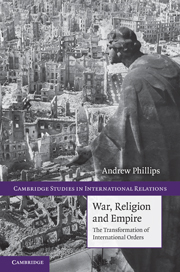Book contents
- Frontmatter
- Contents
- List of tables
- Acknowledgements
- Introduction
- PART I Conceptual framework
- PART II The historical transformation of international orders
- 3 The origins, constitution and decay of Latin Christendom
- 4 The collapse of Latin Christendom
- 5 Anarchy without society: Europe after Christendom and before sovereignty
- 6 The origins, constitution and decay of the Sinosphere
- 7 Heavenly Kingdom, imperial nemesis: Barbarians, martyrs and the crisis of the Sinosphere
- 8 Into the abyss: Barbarians, martyrs and the crisis of the Sinosphere
- 9 The great disorder and the birth of the East Asian sovereign state system
- PART III Contemporary challenges and future trajectories of world order
- Conclusion
- Bibliography
- Index
- Cambridge Studies in International Relations
8 - Into the abyss: Barbarians, martyrs and the crisis of the Sinosphere
Published online by Cambridge University Press: 10 January 2011
- Frontmatter
- Contents
- List of tables
- Acknowledgements
- Introduction
- PART I Conceptual framework
- PART II The historical transformation of international orders
- 3 The origins, constitution and decay of Latin Christendom
- 4 The collapse of Latin Christendom
- 5 Anarchy without society: Europe after Christendom and before sovereignty
- 6 The origins, constitution and decay of the Sinosphere
- 7 Heavenly Kingdom, imperial nemesis: Barbarians, martyrs and the crisis of the Sinosphere
- 8 Into the abyss: Barbarians, martyrs and the crisis of the Sinosphere
- 9 The great disorder and the birth of the East Asian sovereign state system
- PART III Contemporary challenges and future trajectories of world order
- Conclusion
- Bibliography
- Index
- Cambridge Studies in International Relations
Summary
They ought to have learned, from the beating the Japanese pupils of European civilization gave them, that there were not two systems in the world deserving to be called civilization, but one only, and that whatever opposes or rejects this is a higher or lower form of barbarism, doomed to defeat and disappearance. They might have learned this from observation; they have insisted upon learning it from experience …
‘An Army of Civilization’, New York Times, 20 June 1900.In 1900, ‘civilisation’ went to war with China. More precisely, in August of that year, an eight-power expeditionary force entered Beijing with the express goals of relieving the diplomatic legations from besieging Boxer rebels and punishing a dynasty that had sided with Eastern ‘barbarism’ over Western ‘civilisation’. For several agonising weeks, foreign observers had been transfixed by stories of heroism and cruelty emanating from the imperial capital, as besieged diplomats and their families fought valiantly to fend off hordes of xenophobic religious fanatics intent on their destruction. That the vast majority of these stories later proved apocryphal was irrelevant, for they resonated powerfully within a ripening global mythoscape opposing Eastern savagery and irrationality to Western enlightenment and civilisation. From the First Opium War onwards, Westerners had cast themselves as the standard-bearers of civilisation, who would shake the Confucian world from its torpor and unleash the creative energies of Asia's millions by introducing them to the beneficent influences of Christianity, free trade and constitutional government.
- Type
- Chapter
- Information
- War, Religion and EmpireThe Transformation of International Orders, pp. 196 - 225Publisher: Cambridge University PressPrint publication year: 2010



